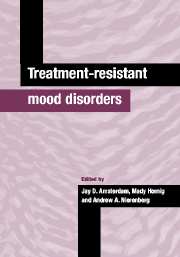Book contents
- Frontmatter
- Contents
- List of contributors
- Preface
- Part I The clinical problem
- Part II Biological basis
- 3 Psychoneuroendocrine aspects of treatment-resistant mood disorders
- 4 Estrogen and depressive illness in women
- 5 Sleep abnormalities in treatment-resistant mood disorders
- 6 Structural and functional brain imaging in treatment-resistant depression
- 7 Immunologic factors in treatment-resistant depression
- Part III Treatment approaches
- Part IV Special patient populations
- Part V Economic and ethical issues
- Index
- Plate Section
3 - Psychoneuroendocrine aspects of treatment-resistant mood disorders
from Part II - Biological basis
Published online by Cambridge University Press: 25 March 2010
- Frontmatter
- Contents
- List of contributors
- Preface
- Part I The clinical problem
- Part II Biological basis
- 3 Psychoneuroendocrine aspects of treatment-resistant mood disorders
- 4 Estrogen and depressive illness in women
- 5 Sleep abnormalities in treatment-resistant mood disorders
- 6 Structural and functional brain imaging in treatment-resistant depression
- 7 Immunologic factors in treatment-resistant depression
- Part III Treatment approaches
- Part IV Special patient populations
- Part V Economic and ethical issues
- Index
- Plate Section
Summary
Introduction
Recent advances in our understanding of hormone action in the brain, coupled with growing evidence of hormonal dysregulation in affective disorders, have prompted the use of hormones and hormone antagonists as endocrinologically based treatments of depression. Since hormonally based treatments presumably act at sites distinct from those of traditional antidepressants, they may specifically benefit patients unresponsive to the latter drugs. Clinical applications of psychoneuroendocrinology are largely in their infancy, but certain strategies have already entered clinical practice and others appear promising. The following selective review begins with the more well-established hormonal therapies for treatment-resistant depression and concludes with less well-studied, but nonetheless biologically informed ones.
Thyroid
Although interest in the role of thyroid hormones in the biology of mood disorders is longstanding, the prevalence of abnormalities and their pathophysiologic significance remains controversial (Fava et al., 1995; Howland, 1995). Some, but not all, investigators have found a higher rate of elevations in total T4 and FT4 in the depressed population than in controls (JoVe & Sokolov, 1994; Nader et al., 1995; Scherer, 1994). Alterations in T3 level and an increased prevalence of antithyroid antibodies have also been reported (Reus & Freimer, 1990), as have low levels of CSF transthyretin (Sullivan et al., 1999). Frank hypothyroidism is rarely found upon routine screening of patients with major depression, but subtle alterations in basal TSH and TSH response to TRH infusion are quite common (Bunevicius et al., 1994, 1996).
Keywords
- Type
- Chapter
- Information
- Treatment-Resistant Mood Disorders , pp. 49 - 79Publisher: Cambridge University PressPrint publication year: 2001

